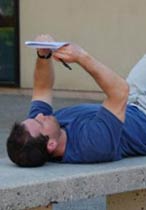Quick Links:
Notable:
Funding Opportunities:
- Stanford Interdisciplinary
Graduate Fellowships
SIGF Application season:
Jan 13 - Mar 15

Jacob Shapiro, PhD '07 Poli Sci, edits his dissertation
Graduate Professional Development Opportunities
Stanford’s graduate students will be leaders in educational, governmental, business, community, and social organizations throughout their lives. This will require more than expertise in your particular field. You will need skills and abilities in leadership, communications, and management.
This page focuses on programs offered by the office of the Vice Provost for Graduate Education. In addition to these VPGE programs, you will also find on this site:
- opportunities for interdisciplinary learning
- career development resources
- practical resources for students, including skills training and information resources.
VPGE Programs
ON LEADERSHIP: A Series of Conversations
Learn first-hand about the experience, challenges and rewards of leadership and about how leaders find his or her own style. There will be plenty of time for questions from the audience and each talk will be more of a conversation than a formal lecture.
More Information
LEADERSHIP DINNERS
An opportunity for small groups to have dinner with recognized leaders. Participants this year will include leaders from government, industry and the non-profit arena.
More Information
LEADERSHIP LABS
Offered by the VPGE and the Graduate School of Business, these condensed workshops offers graduate students from across the campus the opportunity to experience the same leadership curriculum as MBA students.
More Information
LEADERSHIP FROM THE INSIDE OUT
A series of three workshops in November 2010 focusing on helping participants assess some of their core leadership strengths and areas for development.
More Information
QUICK BYTES
Brief, information-rich sessions held over the lunch hour. Each session will focus on an important topic relevant to the professional development of graduate students. Topics cover three general areas: communication, interpersonal skills, and personal development.
More Information
IMPACTING DIVERSITY: Insights from Influential Leaders
This series will bring to Stanford scholars, politicians, philanthropists, and industry leaders who have impacted diversity in a unique and effective manner. These professionals will be asked to share how they have impacted diversity or changed the understanding of diversity in a profound way.
More Information
INTELLECTUAL LEADERSHIP: Creating a Research Agenda
These workshops, each in two sessions, will help you frame and articulate your future research agenda. Workshops are offered for different disciplinary/thematic clusters each quarter, for students whose research focuses on the Humanities, the Social Sciences, Engineering, and on gender-related topics.
More information
MINDSET AND MOTIVATION
This workshop, led by Professor Carol Dweck, discusses mindset and how it relates to achievement, success, and resiliency. The principles discussed in this session will aid in your academics, and many other aspects of your life.
More information
SEVEN SECRETS OF HIGHLY SUCCESSFUL RESEARCH STUDENTS
This workshop describes the key habits that research and experience with thousands of students shows will make a difference to how quickly and easily you complete your research degree. Just as importantly, these habits can greatly reduce the stress and increase the pleasure involved in completing a PhD.
More information
USING EMOTIONAL INTELLIGENCE TO ENHANCE PRODUCTIVITY
This 4-session class will explore the intersection between emotional intelligence and success. Lectures will focus on defining emotional intelligence, review of relevant research by the instructor and others on the application of emotional intelligence at work, guided practice in stress management and other components of emotional intelligence, use of assessment for personal and professional use and the creation of an individual development plan based on assessment and personal goals.
More information
MANAGEMENT MATTERS WORKSHOPS
A series of workshops designed to provide skills-based management techniques. Winter 2011 will include three integrated sessions focused on successfully managing people.
More information
NEGOTIATION AND INFLUENCE (Comm 256)
This course examines the theory, research, and practice of negotiation across a variety of settings. It provides multiple opportunities for students to develop negotiation skills through role-plays, exercises, and useful analytical frameworks.
More information
COMMUNICATION MATTERS WORKSHOPS
In partnership with the Stanford Center for Teaching and Learning, these Spring workshops will focus on communication skills, including some that are not typical of graduate school training but which are essential for leaders in any environment including, but not limited to, negotiation and persuasion.
More information
WISE and WISSH GROUPS FOR WOMEN
Women in Science and Engineering (WISE) and Women in the Social Sciences and the Humanities (WISSH) offer support to women PhD students and postdocs at Stanford. Groups meet weekly for 90 minutes. Meetings are professionally facilitated, and the discussion topics are selected from the concerns of the members
More information
